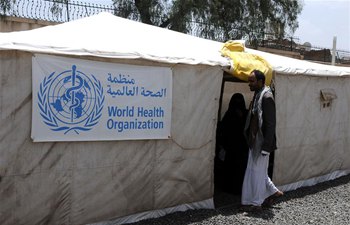WASHINGTON, Aug. 1 (Xinhua) -- American researchers have revealed that the vast reservoir of carbon stored in soil is entering Earth's atmosphere at an increasing rate, most likely as a result of warming temperatures.
A study published on Wednesday in the journal Nature showed that microbes feeding on dead leaves and fallen trees converted the carbon storehouse into carbon dioxide with warmer temperatures.
According to the study, this process is speeding up as Earth warms and is happening faster than plants are absorbing carbon through photosynthesis.
The researchers found that the rate at which microbes are transferring carbon from soil to the atmosphere has increased 1.2 percent over a 25-year time period, from 1990 through 2014.
Globally, soil holds about twice as much carbon as Earth's atmosphere. In a forest where stored carbon is manifest in the trees above, even more carbon resides unseen underfoot.
The finding, based on thousands of observations made by scientists at hundreds of sites around the globe.
"It's important to note that this is a finding based on observations in the real world. This is not a tightly controlled lab experiment," said the paper's first author Ben Bond-Lamberty of the Joint Global Change Research Institute, a partnership between Pacific Northwest National Laboratory and the University of Maryland.
The team relied on the Global Soil Respiration Database that recorded soil respiration from more than 1,500 studies around the globe and FLUXNET that collected data from more than 500 towers around the world recording information about temperature, rainfall and other factors.
Soil respiration describes how microbes and plants in the soil take in substances like carbon to survive, then give off carbon dioxide, according to the study.
When plants and microbes in soil take in carbon as food, they convert some of it to other gases much like we do when we breathe. As temperatures rise, soil respiration increases.
In the 25-year span of the study, the proportion of soil respiration that is due to microbes increased from 54 to 63 percent.
Warmer temperatures can prompt more microbial action, potentially resulting in more carbon being released from carbon pools on land into the air.
"Depending on how other components of the carbon cycle might respond due to climate warming, these soil changes can potentially contribute to even higher temperatures due to a feedback loop," said Bond-Lamberty.

















